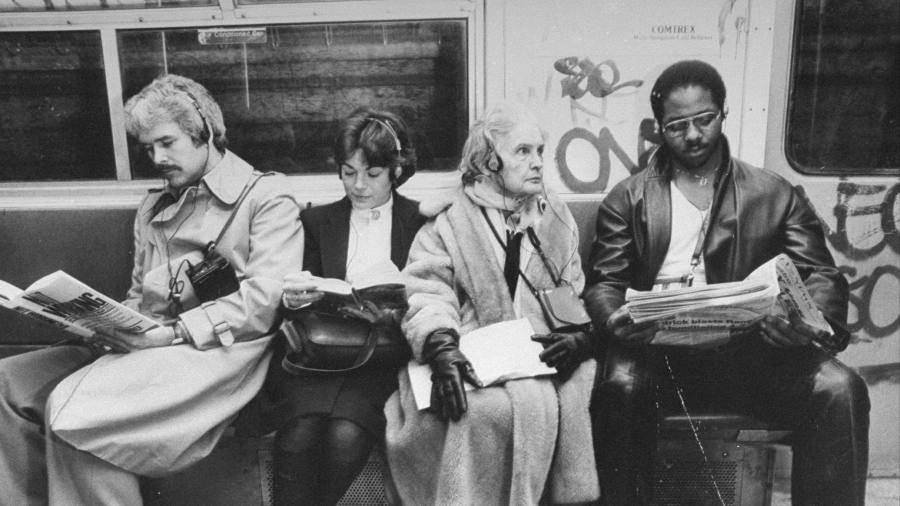1979 was the year of the individual. Thatcherism began. Deng Xiaoping let market forces into China through his “special economic zones”. Meanwhile, in Japan, one of the most liberating consumer goods of the last century went on sale. It allowed people to control their aural environment — and to that extent their mood — at all times. Even the trade name (too gendered to be viable now) suggested a new kind of human being. Neolithic Man. Renaissance Man. Walkman.
Portable private sound: I want to hail the spread of this invention, from luxury product to commonplace. But what strikes me more is how far from universal it still is. On the street and the Tube, in airport lounges and bank queues, most people, even if unaccompanied, have naked ears. No AirPods adorn them. (Nor even the cheapo Philips TAT2206 that I favour.)
If you are among the refuseniks, permit me a question. How can you stand it? The dead air, I mean. The absence of stimulation. Or, worse, the presence of the wrong kind of stimulation. You are at the mercy of other people’s overheard chatter (“She, like, doesn’t have a growth mindset”) and the random honks of life. I like ambient urban noise. I think car-free cities will feel drab and inert. But the point is to tune in and out of the melee at will. Unmediated exposure to it is something that technology has spared us these 44 years.
We still don’t know why, in the 1980s, cities began to reverse their mid-20th-century depopulation. Tougher policing is cited. So is the shift in work from factories (which need space) to services (which don’t). So is the cultural stigma attached to suburbia. To this mix, I’d add the rise of mobile audio. For the first time, urbanites could live in a sensory bubble. They could take the edge off their difficult surroundings. Streets became what Dr Michael Bull, a theorist of this stuff, calls “privatised pleasure palaces”.
As an urban reform, I’d rate the Walkman and its heirs over any transport project or crime bill in my lifetime. The Elizabeth Line is as good as all the first-year anniversary reviews suggest. Boring a new underground shaft in London, that most betunnelled of cities, is a technical feat, like putting a new vein in a wrist. The calming off-white of the stations has something of a Kubrick set about it.
In the end, though, the improvement in urban living will be smaller than that achieved with the iPod. One invention speeds (some) journeys. The other — the flâneur’s friend — made all of them so pleasant that you’d rather dawdle.
The lesson is that technology, not politics, decides the texture of life. I keep reading that I am living through the end of neoliberalism. When was the individual freer, though: a generation ago or now? The tax burden was lower then. Trade between Britain and the continent was easier. The US and China hadn’t fallen out. But your mobile audio device was a Discman, at once too clunky and too frail to use with confidence. So on a walk, you engaged with the city on its terms, not yours. No longer. Multiply that across other atomising creations — Uber, Airbnb — and the idea of a new collectivist age makes more sense on paper than on the street.
Having been brought up properly, I don’t wear earphones while in front of cashiers or other human beings. Being middle-aged, I’ve shed the vast over-ear Sennheisers (I looked as though I was calling in air strikes from a drone) for discreet pods. Other than that, there are no restraints. I have them on seconds before, and seconds after, a social appointment. I feel as restless as a quitting smoker when I leave the flat without them.
Psychobabblers will diagnose this as “avoidant” behaviour, a ruse to avoid being alone with one’s thoughts. I doubt it. My job requires hours on end of silence. I have set up a domestic environment of almost monkish tranquillity. Disappearing into the self is precisely the point. Akio Morita, the great Sony chairman, was sensitive to fears that the Walkman would enable rampant individualism. Thank God they were borne out.
Read the full article here




